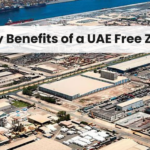Start your Online Business in the UAE
The UAE, especially Dubai and Abu Dhabi, continues to grow as one of the world’s most digital‑friendly business destinations for online business . With no personal tax, advanced digital infrastructure, and regulations that encourage growth, entrepreneurs can effortlessly establish e-commerce stores, freelance services, or tech platforms.
The UAE’s e-commerce market reached an impressive US $5.4 billion in 2024 and and is expected to grow at 10–11% CAGR by 2025–26 .Business-friendly free zones like Dubai CommerCity, IFZA, DTEC, Dubai Silicon Oasis, and Dubai Internet City are attracting entrepreneurs with by offering benefits like 100% foreign ownership, tax exemptions, and good infrastructure designed for online businesses. Under Federal Decree-Law No. 14 of 2023 on e-commerce, which has been in effect since September 2023. This law ensures transparent pricing, return and refund policies, secure payment processing, and enhanced data privacy rights for consumers.
Need help getting started? Contact us now for a personalized UAE business setup plan.
Key Legal & Tax Developments
- On January 1, 2025, the UAE will implement a 15% domestic minimum top-up tax (DMTT) for multinationals with global revenues exceeding €750 million.However, most SMEs and startups can still take advantage of a 9% corporate tax (for profits above AED 375,000) or enjoy free-zone exemptions.
- You must register for VAT if your sales exceed AED 375,000.You can also register voluntarily once you reach AED 187,500, which helps early-stage businesses reclaim VAT paid on expenses.
- E‑commerce consumer protection rules now require 30‑day refund policies, accurate product descriptions, and visible VAT and shipping charges.
- In select free zones, foreign companies can now buy property in Dubai, opening options for long‑term infrastructure or office leases .
Read our previous blog to know more about development and taxes .
Step to setup Online business
-
Select the Jurisdiction
Free Zone: Provides 100% foreign ownership, rapid digital setup, low office needs. Most popular zones are IFZA, DTEC, Dubai CommerCity, DMCC, Dubai Internet City. Ideal for e-commerce, tech, and freelancing for international markets.
Mainland (DED): Sell locally in the UAE, serve local customers, or bid for government contracts. Involves local compliance but grants complete access to the UAE market.
Offshore: Ideal for holding companies, asset protection, or international trade outside the UAE.
-
Define Your Activity & License Type
Choose from official business operations such as e-commerce, IT consulting, or freelance licenses. Verify if you can add to existing licenses or require a new one.
-
Submit Documentation & Incorporation
Provide passport, photo, business plan, and office location (virtual offices are allowed in free zones). Processing typically takes 2–6 weeks.
-
Banking & Payments
Open a corporate bank account (physical presence may be needed). Utilize fintech payment gateways such as Telr, PayTabs, Checkout.com. Make sure to know about secure payment regulations.
-
Digital Launch
Register your domain (opt for .ae if possible), develop your website/app, and add SEO along with social media marketing. Utilize Shopify, Amazon.ae, Noon, or social commerce integrations.
-
Operations & Logistics
Partner with logistics companies such as Aramex, Shipa, Emirates Post. Get regulated product approvals (cosmetics, electronics, supplements).
-
Compliance, VAT & Tax
Register for VAT when your turnover is AED 375,000 or more, or voluntarily at AED 187,500 to recover input VAT. Be compliant with corporate tax regulations . Update records and renew license each year.
Popular Online Business Models to Consider
-
Niche E-commerce Stores
Focusing on specific product categories like fashion, electronics, beauty, or eco-friendly items can really pay off. The UAE’s free zones provide fantastic logistics and warehousing solutions that make managing inventory and shipping a breeze, helping businesses grow quickly. With a tech-savvy and consumer base, amazing quality, exclusivity, or sustainable products can foster strong brand loyalty.
-
Dropshipping & Print-on-Demand
With dropshipping, you can sell products that are shipped straight from suppliers, while print-on-demand allows for customized items like clothing or accessories that are printed as orders come in. Both options minimize risk and simplify operations ideal for testing market demand or niche products in the UAE .
-
Digital Services
There is high demand for services like social media management, digital marketing, content creation, translation, bookkeeping, and IT support in the UAE’s dynamic environment. Many small businesses and startups are looking for cost-effective outsourcing solutions . By offering packaged or subscription-based digital services,you earn consistent monthly income with low ongoing costs.
-
EdTech & Coaching Platforms
As more people show interest in upskilling and freelancing, online education platforms and coaching services are in demand . Platforms that provide language learning, professional certifications, coding bootcamps, or freelance business coaching are tapping into a market of students, professionals, and entrepreneurs upgrading their skills.
Recent Initiatives & News You Should Know
- India–Dubai Digital Corridor: The establishment of Bharat Mart in Jebel Ali Free Zone, and implementation of UPI payment support in the UAE, is revolutionizing cross-border trade. This corridor offers enhanced export opportunities for Indian traders selling through Dubai and facilitates ease of access for online vendors to reach global markets .
- Dubai’s Entrepreneur AI Playbook: Introduced by the Dubai Future Foundation, this innovative program assists entrepreneurs in adopting AI tools across their businesses. From automating customer support to optimizing operations with data analytics, the playbook is designed to help startups future-proof their ventures in an increasingly AI-driven economy .
- Reform in Property Ownership of Free Zones: Recent regulatory changes now allow companies operating in selected free zones to buy or lease property long-term in Dubai . This reform is a major advantage for businesses looking to scale or establish a permanent regional presence, enhancing the UAE’s attractiveness as a business hub .
Estimated Cost
| Milestone | Approx. Timeframe | Estimated Cost (AED) |
| Jurisdiction & license | 2–4 weeks | 5,000 – 12,000 (Free Zone) / 8,000 – 15,000 (Mainland) |
| Virtual office setup | At the same time | 1,000 – 3,000 annually |
| Visa (optional) | 1–2 weeks | 3,000 – 5,000 per visa |
| Website, branding & marketing | 1–4 weeks | 1,500 – 5,000 |
| Logistics integration | 1–2 weeks | Varies based on volume and shipping model |
Things to Keep in Mind While Setting Up Your Online Business in the UAE
- Choose the Right Jurisdiction
Choose Free Zone, Mainshore, or Offshore depending on your target market, ownership requirements, and business operations. - Business Activity & Licensing
Ensure your selected activity is well defined and licensed to prevent compliance issues.
- Local Regulations & Compliance
Stay updated on UAE laws, including recent e-commerce regulations, VAT, corporate tax, and data protection requirements. - Office Requirements
Some jurisdictions require a physical or virtual office—plan accordingly and budget for it. - Banking & Payment Setup
Be aware of UAE laws, such as recent e-commerce legislation, VAT, corporate tax, and data protection obligations.
- Consumer Protection Laws
Ensure transparent pricing, clear return policies, and secure payment processes as per latest federal e-commerce law. - Logistics & Shipping
Collaborate with trusted local couriers and be aware of import/export laws, particularly for controlled goods.. - Digital Marketing & SEO
Buy online presence from the start through SEO, social media, and marketplaces such as Amazon.ae or Noon for visibility.
- Costs & Budgeting
For licensing, visas, office, marketing, and logistics costs to avoid risks.
Conclusion
In 2025, the UAE is rapidly evolving into a global digital hub. It offers fast setups, low tax policies, amazing infrastructure, and transparent regulations. And also there are smart initiatives like AI adoption programs, the India UAE digital trade corridor, and fresh reforms for free zone property ownership, all laying down a solid foundation for launching and expanding your online business.
If you’re thinking about starting a dropshipping store, a digital service agency, or a cross-border e-commerce brand, keeping up with the latest rules and market changes and acting early can give you a big advantage.
Need help choosing the best free zone, drafting a setup plan, or setting up your bank & payment system?
Let’s build your business—faster, smarter, and future-ready. Contact us today for expert assistance
Sources :
- Federal Tax Authority (FTA UAE) – https://tax.gov.ae
- The Times of India, Indiatimes
- Ministry of Economy UAE – https://moec.gov.ae
FAQs
- Can a foreigner start an online business in Dubai?
Yes. In the majority of UAE free zones, foreigners are able to own 100% of a company without requiring a local sponsor. You have the option to pick a jurisdiction according to your market (international vs domestic) and business model.
- Do I need to be present in Dubai physically to open an online business?
Not necessarily. A number of free zones enable remote incorporation and virtual office arrangements. Yet, for receiving banks or issuance of visas, a short trip might be necessary.
- What is the minimum investment required to start an e-business in the UAE?
One can start with a free zone license from AED 5,000–8,000. Total setup office, visa, and website may be as high as AED 10,000–20,000 depending upon your requirements.
- What kind of license do I require for my e-commerce business?
You’ll require an e-commerce license, which several free zones such as IFZA, Dubai CommerCity, and DTEC provide. Mainland alternatives are possible if selling online directly to UAE residents.
- Do online companies need VAT registration?
Yes, provided your taxable turnover is more than AED 375,000 per year. You may choose to register voluntarily at AED 187,500, which enables you to recover input VAT.
- May I open a bank account for my online business in the UAE?
Yes, but banks generally ask for business documents and sometimes insist on your presence. You can also consider digital banks and fintech solutions such as Wio, Zand, or PayTabs.
- Which are the best platforms to sell online in the UAE?
Well-known platforms are Shopify, Amazon.ae, Noon, Instagram Shop, and local marketplaces. Social commerce is also on the rise in 2025.
- Does the UAE have consumer protection laws for e-commerce?
Yes. Federal Decree-Law No. 14 of 2023 requires **transparent return policies, prices inclusive of VAT, secure payment, and data protection** for consumers purchasing online.
- What are the most viable business models online in the UAE?
Dropshipping, niche e-commerce, digital services, and education/coaching platforms are scalable and in demand. Select a model that fits your skill and market demand.
- Do I require a visa to operate an online business in the UAE?
Not necessarily for establishment, but if you want to reside in the UAE or sponsor staff , you will need a residency visa. Free zones typically provide visa packages with business licenses.













